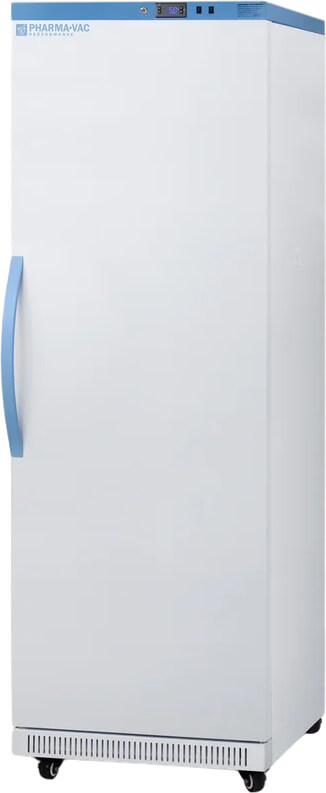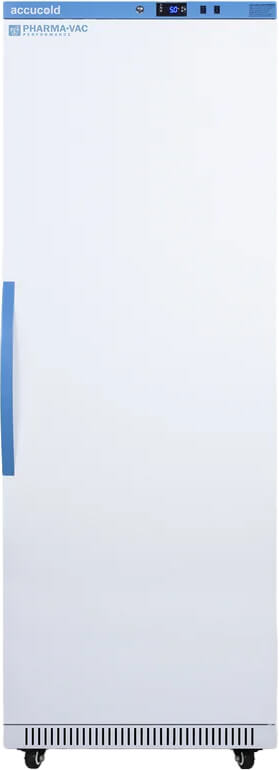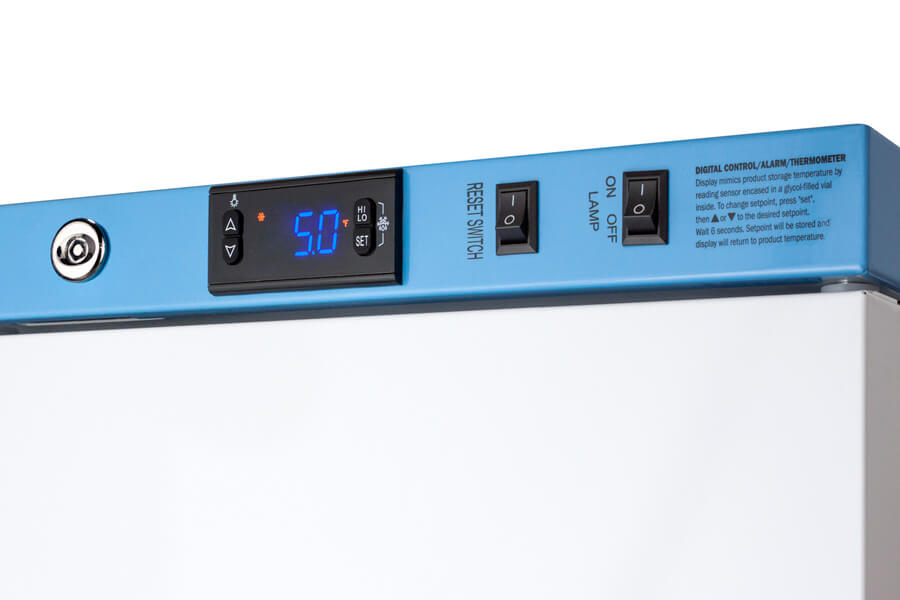In the field of healthcare, the proper storage of vaccines is of utmost importance. Vaccines are delicate substances that require specific temperature conditions to maintain their efficacy. To address this critical need, Auxo Medical presents the Accucold 18 Cu.Ft. Upright Vaccine Refrigerator. This state-of-the-art refrigerator is designed to meet the highest standards in vaccine storage, ensuring compliance with the NSF/ANSI 456 Vaccine Storage Standard. In this article, we will explore the features and benefits of the Accucold 18 Cu.Ft. Upright Vaccine Refrigerator, highlighting its importance in maintaining the integrity of vaccines and medications.
The Importance of Proper Vaccine Storage
Vaccines are essential tools in preventing the spread of infectious diseases and safeguarding public health. However, their efficacy can be compromised if they are not stored at the correct temperature. Improper storage conditions can lead to a loss of potency, rendering the vaccines ineffective. This not only puts patients at risk but also results in significant financial losses for healthcare providers.
The Accucold 18 Cu.Ft. Upright Vaccine Refrigerator: A Solution for Optimal Vaccine Storage
 The Accucold 18 Cu.Ft. Upright Vaccine Refrigerator is purpose-built to address the specific storage requirements of vaccines, medications, and pharmacy applications. It is designed to meet the guidelines set by the CDC/VFC and is certified to the NSF/ANSI 456 Vaccine Storage Standard. Let’s explore the key features that make this refrigerator an ideal choice for healthcare professionals.
The Accucold 18 Cu.Ft. Upright Vaccine Refrigerator is purpose-built to address the specific storage requirements of vaccines, medications, and pharmacy applications. It is designed to meet the guidelines set by the CDC/VFC and is certified to the NSF/ANSI 456 Vaccine Storage Standard. Let’s explore the key features that make this refrigerator an ideal choice for healthcare professionals.
Robust Temperature Management System
The Accucold 18 Cu.Ft. Upright Vaccine Refrigerator is equipped with a robust temperature management system. It can maintain an interior temperature with a minimal variation of +/-1ºC, ensuring the preservation of sensitive vaccines. This precise temperature control is crucial for maintaining the integrity and efficacy of vaccines over an extended period.
Certification and Calibration
To provide healthcare professionals with peace of mind, the Accucold 18 Cu.Ft. Upright Vaccine Refrigerator comes with a 2-year calibration certificate. This certificate ensures that the refrigerator is operating within the required temperature range and provides documentation for regulatory compliance.
Antimicrobial Silver Ion-Coated Handle
Hygiene is a top priority in healthcare settings. The Accucold 18 Cu.Ft. Upright Vaccine Refrigerator features an antimicrobial silver ion-coated handle. This coating helps minimize the spread of germs and ensures a clean and safe environment for vaccine storage.
Adjustable Temperature Settings
Different vaccines require specific temperature ranges for optimal storage. The Accucold 18 Cu.Ft. Upright Vaccine Refrigerator offers adjustable temperature settings between +2 to +8ºC. This flexibility allows healthcare professionals to customize the temperature according to the requirements of the vaccines being stored.
Suite of Alarms for Safety and Reliability
 The Accucold 18 Cu.Ft. Upright Vaccine Refrigerator is equipped with a suite of alarms to ensure safety and reliability. These alarms include temperature deviation, open door, power failure, and sensor disruption alarms. These alerts help healthcare professionals quickly identify and address any issues that may affect the integrity of the stored vaccines.
The Accucold 18 Cu.Ft. Upright Vaccine Refrigerator is equipped with a suite of alarms to ensure safety and reliability. These alarms include temperature deviation, open door, power failure, and sensor disruption alarms. These alerts help healthcare professionals quickly identify and address any issues that may affect the integrity of the stored vaccines.
Remote Alarm Contacts for External Monitoring
For added convenience and peace of mind, the Accucold 18 Cu.Ft. Upright Vaccine Refrigerator features remote alarm contacts. These contacts allow for external monitoring of the refrigerator’s alarms, ensuring that any deviations from the desired temperature range are promptly addressed.
Automatic Defrost and Ice Build-Up Prevention
Ice build-up can compromise the efficiency of a refrigerator and affect the temperature stability inside. The Accucold 18 Cu.Ft. Upright Vaccine Refrigerator is designed with an automatic defrost system and adjustable defrost cycles to prevent ice build-up. This feature ensures consistent performance and eliminates the need for manual defrosting.
User-Friendly Microprocessor Control Panel
The Accucold 18 Cu.Ft. Upright Vaccine Refrigerator features a user-friendly microprocessor control panel. This panel provides digital readouts for precise temperature management. The intuitive controls allow healthcare professionals to monitor and adjust the temperature settings with ease.
Ample Storage Space and Convenience Features
The Accucold 18 Cu.Ft. Upright Vaccine Refrigerator offers ample storage space for vaccines and medications. It features adjustable plastic-coated wire shelves that optimize air circulation within the refrigerator. The shelves can be positioned to accommodate various storage needs, ensuring proper organization and accessibility.
To enhance convenience, the refrigerator is equipped with a self-closing door, LED interior lighting, and a reversible door option. The self-closing door ensures that the refrigerator remains closed, minimizing temperature fluctuations. The LED interior lighting provides clear visibility, and the reversible door option allows for flexible installation based on the layout of the healthcare facility.
Ordering the Accucold 18 Cu. Ft. Upright Vaccine Refrigerator from Auxo Medical is a smart choice for healthcare facilities looking to ensure the efficacy of their vaccine storage. With its spacious 18 cubic foot capacity, this upright refrigerator is designed to meet the rigorous standards required for the proper storage of vaccines, providing precise temperature control to maintain the integrity of sensitive biologicals. Auxo Medical, known for its commitment to quality and service, offers this state-of-the-art refrigerator with advanced features such as temperature alarms, digital controls, and an efficient cooling system. By choosing to order from Auxo Medical, healthcare providers can rest assured that they are investing in a reliable solution for their vaccine storage needs, backed by professional support and service to ensure seamless operation.
Accucold 18 Cu.Ft. Upright Vaccine Refrigerator, Certified to NSF/ANSI 456 Vaccine Storage Standard
Request Quote
The Accucold 18 Cu.Ft. Upright Vaccine Refrigerator is a state-of-the-art solution designed specifically for the storage of vaccines, medications, and pharmacy applications, ensuring compliance with CDC/VFC guidelines and certification to NSF/ANSI 456 Vaccine Storage Standard. This refrigerator features a robust temperature management system, capable of maintaining an interior temperature with a minimal variation of +/-1ºC, crucial for preserving the integrity of sensitive vaccines. It comes equipped with a 2-year calibration certificate, antimicrobial silver ion-coated handle to minimize germ spread, and adjustable temperature settings between +2 to +8ºC. Enhanced with a suite of alarms for temperature deviation, open door, power failure, and sensor disruption, it ensures the utmost safety and reliability. The unit also features remote alarm contacts for external monitoring, automatic defrost with adjustable cycles to prevent ice build-up, and a user-friendly microprocessor control panel with digital readouts for precise temperature management. The refrigerator offers ample storage space with adjustable plastic-coated wire shelves for optimal circulation, a factory-installed lock for security, and locking casters for mobility. Its efficient design, including a self-closing door, LED interior lighting, and a reversible door option, underscores its commitment to convenience and versatility in professional healthcare environments.
Description
Certified to NSF/ANSI 456 Vaccine Storage Standard
Features:
- Purpose-built design
Designed and purpose-built for pharmacy, medication, and vaccine applications to support meeting CDC/VFC guidelines - +/-1ºC Variation
The published temperature variation is derived from the maximum deviation of an NTC sensor in a 1 oz. vial located nearest the chamber geometric center during a 24 hour test period - Certificate of calibration included
2-year calibration certificate included for your records - Antimicrobial silver ion-coated handle
Powder-coated handle with naturally occurring silver ions to help reduce the spread of germs - Adjustable temperature
Intuitive controls let you adjust the interior temperature between +2 to +8ºC - Temperature alarm
Visual and audible alarms alert if the interior temperature rises or falls out of set range - Remote alarm contacts
Electronic controller is equipped with a volt-free contact for alarm forwarding to an external remote system (contacts located in the external rear of the unit) - Automatic defrost with adjustable cycle defrost
Adjustable cycle defrost operation ensures the unit avoid temperature spikes and ice buildup - Access port
Includes a pre-installed 1/2″ probe hole in the right interior wall to allow easier connection to user-provided monitoring equipment - Open door alarm
Alarm will sound if the door is left ajar for over 4 minutes (adjustable from 1-99 minutes) - Audible power failure alarm
Battery-powered alarm sounds if the power connection is interrupted - Sensor failure alarm
Audible and visual alarm warns if the sensor is disrupted - Password protection
Control panel requires password entry to adjust the parameters beyond the set point - Microprocessor control panel
Digital controls with a large LED readout in Celsius or Fahrenheit for intuitive temperature management - Resettable min/max display
Control panel provides a readout of the low and high temperatures in 15 minute increments - Factory-installed lock
Keyed lock conveniently located towards the top of the door for added security (2 keys included) - Adjustable plastic-coated wire shelves for improved circulation
Shelves can be positioned with a front lip for small storage items or reversed to a flat position to better hold larger items, with multiple shelf positions spaced at 1/2″ to accommodate virtually any size - Interior light
Energy efficient LED lighting with internal on/off switch - Self-closing door
Added protection in busy settings - Right hand door swing
For this unit with the door opening from the other side, order with option “LHD” or as SKU ARS18PV456LHD - Magnetic door gasket
Quality door gaskets ensure a tight seal for energy savings - Locking casters
Four pre-installed 3″ wheels with brakes ensure smooth mobility, making it easier to clean around and underneath the unit as needed
Specs:
- Height of Cabinet 78.5″ (199 cm)
- Width 27.5″ (70 cm)
- Width with Door Open 28.0″ (71 cm)
- Depth 26.0″ (66 cm)
- Depth with Handle 27.75″ (70 cm)
- Depth with door at 90° 52.0″ (132 cm)
- Capacity 18.0 cu.ft. (510 L)
- Defrost Type Automatic
- Door White
- Cabinet White
- US Electrical Safety ETL
- Canadian Electrical Safety ETL-C
- Sanitation ETL-S to NSF 456
- Amps 1.5
- Voltage/Frequency 115 V AC/60 Hz
- Weight 270.0 lbs. (122 kg)
- Shipping Weight 300.0 lbs. (136 kg)
- Parts & Labor Warranty 2 Years
- Compressor Warranty 5 Years
- UPC 761101090689
- Refrigerator Features
- Door Swing RHD
- Reversible Factory Reversible
- Shelf Type Wire
- Shelf Qty 7
- Adjustable Shelves Yes
- Thermostat Type Digital
- Fan Type Interior
- Refrigerant Type R290a
- Refrigerant Amount 1.75oz.
- High Side PSI 280.0
- Low Side PSI 90.0
- Wheel Qty 4
- Interior Light Yes
- Temperature Range 2 to 8ºC
- Dimensions
- Interior Height 68.5″ (174 cm)
- Interior Width 24.13″ (61 cm)
- Interior Depth 18.75″ (48 cm)
- Compressor Step Height 6.5″ (17 cm)
- Compressor Step Width 24.13″ (61 cm)
- Compressor Step Depth 6.5″ (17 cm)
Frequently Asked Questions (FAQ)
- What is the NSF/ANSI 456 Vaccine Storage Standard?
The NSF/ANSI 456 Vaccine Storage Standard is a set of guidelines and requirements for the proper storage and handling of vaccines. It ensures that vaccines are stored at the correct temperature to maintain their efficacy and prevent any potential harm to patients.
- Why is temperature control important for vaccine storage?
Temperature control is crucial for vaccine storage because vaccines are sensitive to temperature fluctuations. If vaccines are exposed to temperatures outside the recommended range, their potency can be compromised, rendering them ineffective in preventing diseases.
- Can the Accucold 18 Cu.Ft. Upright Vaccine Refrigerator be used for other medical applications?
While the Accucold 18 Cu.Ft. Upright Vaccine Refrigerator is specifically designed for vaccine storage, it can also be used for the storage of medications and other pharmacy applications that require temperature control.
- How often should the Accucold 18 Cu.Ft. Upright Vaccine Refrigerator be calibrated?
The Accucold 18 Cu.Ft. Upright Vaccine Refrigerator comes with a 2-year calibration certificate. However, it is recommended to have the refrigerator calibrated annually to ensure accurate temperature control and regulatory compliance.
- Can the Accucold 18 Cu.Ft. Upright Vaccine Refrigerator be customized to fit specific storage needs?
Yes, the Accucold 18 Cu.Ft. Upright Vaccine Refrigerator offers adjustable shelves that can be positioned to accommodate various storage needs. This flexibility allows healthcare providers to optimize the storage space based on their specific requirements.
Additional Auxo Medical Services and Support
Auxo Medical not only provides high-quality medical equipment like the Accucold 18 Cu.Ft. Upright Vaccine Refrigerator but also offers a range of additional services to support healthcare providers. Let’s explore some of these services:
Auxo Medical has a team of knowledgeable professionals who can provide sales consultation and support. They can assist healthcare providers in choosing the right equipment for their specific needs and offer guidance on proper usage and maintenance.
Auxo Medical also offers valuation and liquidation services for medical equipment. This service can be beneficial for healthcare facilities looking to sell or dispose of their existing equipment in a responsible and efficient manner.
To make the acquisition of medical equipment more accessible, Auxo Medical provides financing options. These options allow healthcare providers to spread out the cost of equipment over time, making it easier to manage their budget while still obtaining the necessary equipment.





